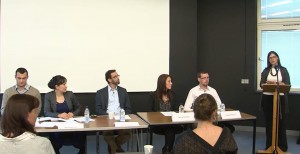-
 The
final debate of the ICHRDP brought together postgraduate students from the
University of Essex and the National University of Ireland Galway. They
explored the advantages and limitations to arguing for a right to use illicit
drugs.
The
final debate of the ICHRDP brought together postgraduate students from the
University of Essex and the National University of Ireland Galway. They
explored the advantages and limitations to arguing for a right to use illicit
drugs.Ms. Jahantab Faiz and Mr. Said Kurbonoshoev, who represented the Essex team, argued in favour of constituting drug use as a right. They claimed that drug use fits into the rights approach in many scenarios, and criminalization is on principle unfair.
Why should the government prohibit what to put into our bodies? they asked. Prohibition breaches many rights, including the right to privacy, the right to religion and cultural traditions, among others. Moreover, they argued there is enough evidence that prohibition has failed and a rights-based approach is more realistic.
The Galway team, formed by Mr. Daniel Morris and Ms. Susan Warren, proposed a freedom-based approach to drug use. They argued that while there might be a freedom to use drugs. An analogy would be to be free to drive a car, but not to have a right to do so. To frame it as a right would put an unrealistic obligation on states. Instead, they argued that a freedom approach would give the necessary flexibility to adjust drug policy with a view of protecting people’s health.
In the rebuttal, the Essex team argued the rights versus freedoms distinction does not hold because they are mutually implicated. Moreover, a rights approach does not mean unmediated right to use drugs. Some restrictions would be, for example, on people with problematic drug use.
A point in the rebuttal by the NUI Galway team was that a right to use drugs would lead precisely to endless regulation scenarios, to the point that the ‘right’ would be very different from the notion of right we hold today.
In conclusion, both teams agreed that the drug prohibition paradigm is obsolete, and as a policy, it does more harm than good. However, they differ on the theoretical approach that would be more conducive to reducing the harm of drugs while respecting individual freedom.
Essex was voted the winning team by a narrow margin and Mr. Said Kurbonshoev was voted the best mooter. He was granted a scholarship to the 2013 Summer School on Human Rights and Drug Policy at the Central European University, provided by the Open Society Foundations.
-
Essex Team:
Ms. Jahantab Faiz, Candidate for MA in Human Rights, University of Essex.
Mr. Said Kurbonshoev, Candidate for LLM in International Human Rights and Humanitarian Law, University of Essex.
NUI Galway Team:
Mr. Daniel Morris, LLM in International Human Rights Law, Irish Centre for Human Rights, National University of Ireland, Galway
Ms. Susan Warren, LLM in International Human Rights Law, Irish Centre for Human Rights, National University of Ireland, Galway
-
How would a rights approach tranform drug policies?
Do you think the creation of a right to use illicit drugs is a utopia? What can we learn from the history of drug use in different continent and different epistemological perspectives?
Do you agree with the NUI Galway team that it would be necessary to implement an extensive regulatory framework for drug use that it would render the concept of 'right to use drugs' inoperative?
What are the main problems associated with paternalistic policies? Are there any theories providing a balanced approach to the intervention of the State in matters of health policy and individual freedom?
-
International Network of People who Use Drugs (2008), 'Nothing About Us, Without Us: Manifesto by People who Use Illicit Drugs', Canadian HIV/AIDS Legal Network, International HIV/AIDS Alliance and the Open Society Institute. Available in the e-library.
Rehm, J., Brissette, S., Brochu, S., Bruneau, J., El-Guebaly, N., Noël, M. L., ... & Baliunas, M. D. (2005). Illicit opioid use in Canada: comparing social, health, and drug use characteristics of untreated users in five cities (OPICAN study). Journal of Urban Health, 82(2), 250-266. Available in the e-library.
Transform Drug Policy Foundation. (2007) After the War on Drugs: Tools for the Debate. Transform. Available online.
Rolles, S.(2009) Afer the War on Drugs: Blueprint for Regulation. Tranform Drug Policy Foundation. Available online.
Wisotsky, S. (1992) A Society of Suspects: The War on Drugs and Civil Liberties. Cato Institute, October 2, 1992. Available online.
